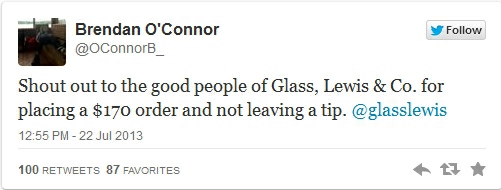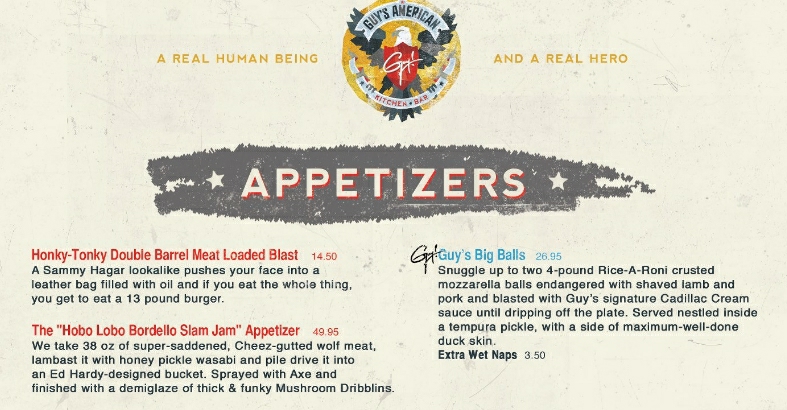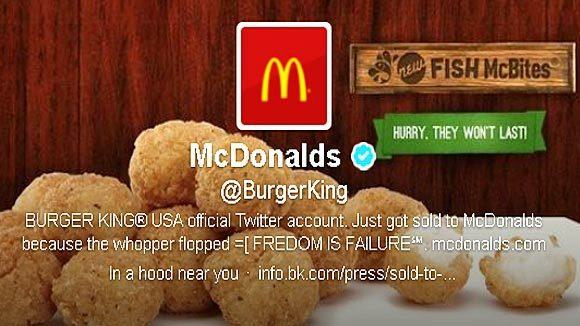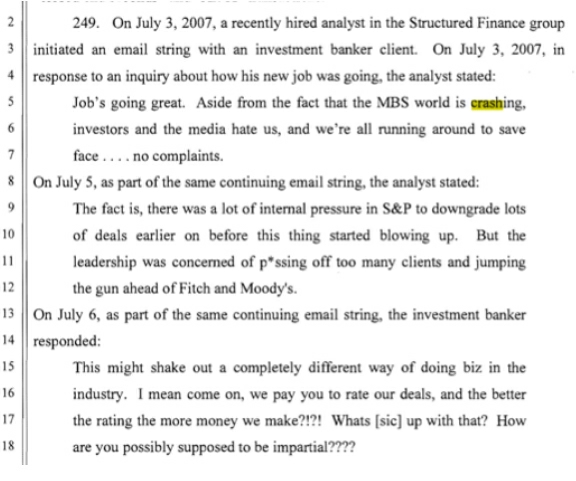Food Truck Employee Gets Fired for a Tweet
Unhappy about not receiving a tip, a food truck employee let loose on Twitter:
Employees at Glass Lewis & Company, a consultancy specializing in corporate governance, ordered $170 worth of grilled cheese sandwiches and milkshakes but didn't leave a tip. Brendan O'Connor, the Milk Truck employee, chronicled the incident on his blog:
"I was making sandwiches, another worker took the order and a third made the milkshakes and watched the grills. A line grew while we worked, and we had to tell other customers that their lunch orders would take longer than usual. They paid; I asked my co-worker who was dealing with the money how much of a tip they'd left. They had left actually no tip at all. (They had paid with a card so we checked the cash tips to see if there'd been a bump. There hadn't.)
"I asked some of the group as they were picking up their orders if they had intended to not tip. They hemmed and hawed and walked away.
"Well. I could have not said anything. I could have made it a subtweet. I probably should have made it a subtweet. But I didn't, because of some misguided notions about having 'the courage of your convictions,' or whatever."
O'Connor explains that he was fired by the owner after someone from Glass Lewis complained about being "tip-shamed." O'Connor's argument is that his employer uses social media feedback to monitor employees' performance, so why shouldn't he use social media to "advocate for a more civil exchange between worker and consumer?"
Well, no companies want their customers embarrassed publicly, and many have policies in place to this effect. Milk Truck managed to restore its credibility with an apology tweet, accepted by Glass Lewis:

But Twitter is still abuzz with the ethics of the situation. Did Milk Truck do the right thing by terminating O'Connor? Was O'Connor's tweet justified? Does Glass Lewis owe an apology? What's your view?
Why Employers Shouldn't Care About Facebook Photos of Drinking
 HR and hiring managers are passing up good candidates who post or are tagged in photos of drinking, according to a new study. The study by Stoughton, Thompson, and Meade, "Big Five Personality Traits Reflected in Job Applicants' Social Media Postings," was published in Cyberpsychology, Behavior and Social Networking.
HR and hiring managers are passing up good candidates who post or are tagged in photos of drinking, according to a new study. The study by Stoughton, Thompson, and Meade, "Big Five Personality Traits Reflected in Job Applicants' Social Media Postings," was published in Cyberpsychology, Behavior and Social Networking.
Explaining the rationale for searching for candidates online, co-author Dr. Lori Foster Thompson said, "Companies often scan a job applicant's Facebook profile to see whether there is evidence of drug or alcohol use, believing that such behavior means the applicant is not 'conscientious,' or responsible and self-disciplined." But posting such content is not correlated with conscientiousness. Further, those who post rated highly on extrovert measures, which employers may value.
However, the study warns companies to avoid people who "bad-mouth" or post negative comments about an employer online. People who rated highly on agreeableness and conscientiousness were very unlikely to post such content.
This advice is consistent with a recent Wall Street Journal article, which reported that 44% of employers would not hire someone found to be "badmouthing employers on social media." The author of this article also suggested, "While some employers may be willing to overlook the occasional rowdy photo or off-color tweet, it goes without saying that any post linking a job candidate to illicit activity such as drinking and driving or illegal drugs, or to racist or sexist behavior, won't go over well."
A recent Harris Interactive/Career Builder study showed that 43% of employers have rejected candidates based on their social media posts, and 48% of them did so because "There was info about candidate drinking or using drugs." These employers may want to reconsider their practices.
Discussion Starters:
- What's your view of the study findings? Do you agree with the two main conclusions: that Facebook posts about drinking don't indicate poor job qualifications but that negative posts about employers might be a good reason to disqualify a candidate?
- How, if at all, does this study influence what you will post or how you will handle posts on your Facebook page?
Tactile Brazilians and Other French Stereotypes
The French tourism board is trying to help retailers, restaurateurs, hoteliers, and taxi drivers be more welcoming to visitors. But the "Do You Speak Touriste?" website provides stereotypes that some may find offensive.
According to The Telegraph, the tourism guide (downloadable in French) offers these helpful hints for French business owners (note that the punctuation is European):
The guide informs Parisians that the British "like to be called by their first name", spend an average of 145 euros (£124) per person per day – more than their American counterparts – and eat breakfast from 7.30-8.30am, lunch at 12-1pm and supper at 6-7pm.
They seek a mixture of "authenticity and relaxedness", expect smiling and friendly staff" and appreciate "architecture, traditional gastronomy and the need for a playful (approach to culture)."
The Japanese are the biggest spenders – 186 euros per tourist per day – but need constant reassurance and are "discreet but demanding". "They never complain straight away when they are not satisfied but will criticise once back in their own country."
The Chinese have an "idealised and romantic" view of Paris, and come "above all for luxury shopping."
Brazilians, meanwhile are "easily tactile", expect a "totally poetic experience" and spend more than the British, around 166 euros per day.
Parisians are told that cash-strapped Spaniards are on the "lookout for freebies" and expect you to speak their language, while Italians are delighted if you are nice to their children, like "going on excursions" but are "impatient tourists".
Perhaps the trickiest visitors of all, judging by the guide, are the French themselves, described as "particularly demanding" guests who above all "don't want to be considered as tourists".
Jeanerre Blat, general director of the Paris area tourist board, explained the board's philosophy:
"The aim is to fight against the poor reputation for welcome in Paris and the Paris area. You don't welcome a Japanese tourist the same way as an Italian one. There are codes to take into account, so you have to adapt."
Discussion Starters:
- What's the value of stereotyping? In other words, what's the value of this guidance for French business owners?
- Looking at the examples of nationalities above, are you more offended by some than by others? Which and why? Or do you find none offensive?
- Could the tourism board have met its objectives in another way? If so, how?
- Before The Telegraph paragraph, I wrote that the punctuation is European. Revise it to meet American standards.
George Takei's Ghost Writer Fesses Up
George Takei, 1960s Star Trek cast member, is highly popular on Facebook. But his posts have been written, at least in part, by someone paid $10 per joke. With 4.1 million likes, Takei's Facebook page is a mix of cartoons, jokes, and other lighthearted posts.
Rick Polito came clean in an email to Jim Romenesko's blog but seemed to have regretted the decision after a few days' rest:
"Polito tells Romenesko readers today: 'I wrote an apology to George and Brad and their guy said he'd pass it on. I just said that I'd been looking for any mention of my book I could get and that I hadn't meant to expose anything.
"He adds: 'I don't update his page. I've had no direct contact with George. I've sent him some memes, as have other comedian types and I was happy for the exposure.'"
In an email to Wired, Takei doesn't share his fans' concern:
"What is this hoo-ha about my FB posts? I have Brad, my husband, to help me and interns to assist. What is important is the reliability of my posts being there to greet my fans with a smile or a giggle every morning. That's how we keep on growing."
Discussion Starters:
- Compare this situation to that of Mark Davidson, whose tweet writer exposed him on his own Twitter feed. What are the similarities and differences?
- How do you assess this situation? Under what circumstances is it acceptable for someone to write social media posts on another's behalf?
Study Shows Value of Internal Social Networks
A Kellogg School study found positive effects of an internal social networking system at a major credit card company.
 As more companies implement enterprise social media tools, Paul Leonardi, a professor of communication at Northwestern University, wanted to evaluate their usefulness. The credit card company was installing "A-Life," and Leonardi compared two groups, marketing and operations, to see the impact. The marketing group was given access to the system, while the operations group was not. Before the six-month period, employees were asked who within the organization knew what-an important question for knowledge management and for getting work done.
As more companies implement enterprise social media tools, Paul Leonardi, a professor of communication at Northwestern University, wanted to evaluate their usefulness. The credit card company was installing "A-Life," and Leonardi compared two groups, marketing and operations, to see the impact. The marketing group was given access to the system, while the operations group was not. Before the six-month period, employees were asked who within the organization knew what-an important question for knowledge management and for getting work done.
After using the site rather than email, the marketing group reported a 31% improvement to find information and a 71% improvement in finding people who knew those with needed information.
Perhaps most interesting is that younger employees were the most skeptical of the system, as a Kellogg article explains:
"...he found that use differed by age: younger employees across the company were generally more skeptical of the tool. 'So many young people use social media tools'-like Facebook and Twitter-' their lives daily,' and those tools are really for social, non-work-related communication, says Leonardi. This, he believes, made it harder for younger employees to embrace social technology in the workplace. 'They would say, "Oh, I don't want to be posting things my boss would see." … On the other hand, the senior employees didn't have that same concern. For them, the technology was another mode for communicating about work-related matters.'"
Discussion Starters:
- What, if any, social networking tools have you used at work? What do you see as the benefits and potential pitfalls?
- Are you surprised at the results about younger employees? Why or why not?
General's Email About Reading
Marine General James Mattis's email response to a colleague who was "too busy to read" offers good lessons for business leaders-and writers. The 2004 email went viral and was recently published on a blog and picked up by Business Insider.
Here is the email:
The problem with being too busy to read is that you learn by experience (or by your men's experience), i.e. the hard way. By reading, you learn through others' experiences, generally a better way to do business, especially in our line of work where the consequences of incompetence are so final for young men.
Thanks to my reading, I have never been caught flat-footed by any situation, never at a loss for how any problem has been addressed (successfully or unsuccessfully) before. It doesn't give me all the answers, but it lights what is often a dark path ahead."
With [Task Force] 58, I had w/ me Slim's book, books about the Russian and British experiences in [Afghanistan], and a couple others. Going into Iraq, "The Siege" (about the Brits' defeat at Al Kut in WW I) was req'd reading for field grade officers. I also had Slim's book; reviewed T.E. Lawrence's "Seven Pillars of Wisdom"; a good book about the life of Gertrude Bell (the Brit archaeologist who virtually founded the modern Iraq state in the aftermath of WW I and the fall of the Ottoman empire); and "From Beirut to Jerusalem". I also went deeply into Liddell Hart's book on Sherman, and Fuller's book on Alexander the Great got a lot of my attention (although I never imagined that my HQ would end up only 500 meters from where he lay in state in Babylon).
Ultimately, a real understanding of history means that we face NOTHING new under the sun.
For all the "4th Generation of War" intellectuals running around today saying that the nature of war has fundamentally changed, the tactics are wholly new, etc, I must respectfully say … "Not really": Alex the Great would not be in the least bit perplexed by the enemy that we face right now in Iraq, and our leaders going into this fight do their troops a disservice by not studying (studying, vice just reading) the men who have gone before us.
We have been fighting on this planet for 5000 years and we should take advantage of their experience. "Winging it" and filling body bags as we sort out what works reminds us of the moral dictates and the cost of incompetence in our profession. As commanders and staff officers, we are coaches and sentries for our units: how can we coach anything if we don't know a hell of a lot more than just the [Tactics, Techniques, and Procedures]? What happens when you're on a dynamic battlefield and things are changing faster than higher [Headquarters] can stay abreast? Do you not adapt because you cannot conceptualize faster than the enemy's adaptation? (Darwin has a pretty good theory about the outcome for those who cannot adapt to changing circumstance - in the information age things can change rather abruptly and at warp speed, especially the moral high ground which our regimented thinkers cede far too quickly in our recent fights.) And how can you be a sentinel and not have your unit caught flat-footed if you don't know what the warning signs are - that your unit's preps are not sufficient for the specifics of a tasking that you have not anticipated?
Perhaps if you are in support functions waiting on the warfighters to spell out the specifics of what you are to do, you can avoid the consequences of not reading. Those who must adapt to overcoming an independent enemy's will are not allowed that luxury.
This is not new to the USMC approach to warfighting - Going into Kuwait 12 years ago, I read (and reread) Rommel's Papers (remember "Kampstaffel"?), Montgomery's book ("Eyes Officers"…), "Grant Takes Command" (need for commanders to get along, "commanders' relationships" being more important than "command relationships"), and some others.
As a result, the enemy has paid when I had the opportunity to go against them, and I believe that many of my young guys lived because I didn't waste their lives because I didn't have the vision in my mind of how to destroy the enemy at least cost to our guys and to the innocents on the battlefields.
Hope this answers your question…. I will cc my ADC in the event he can add to this. He is the only officer I know who has read more than I.
We know that General Mattis is an avid reader because he writes well. Reading is essential for good writing.
Discussion Starters:
- What do you read? In what ways does it help you?
- Do you agree with my assertion that reading is essential to good writing? Why or why not?
Ethical Social Media Marketing After the Boston Bombings
An article by Augie Ray, director of social media for a Fortune 100 company, describes the ethics of social media marketing, and gives us several interesting examples from the Boston Marathon tragedy. In contrast to these companies that perhaps crossed an ethical line, recall El Pelon Taqueria, the restaurant that offered help and asked for nothing in return.
Calling it a "desperate attempt to trade on people's feelings," Ray described an NBC Facebook picture of a boy in a hospital bed. The post asks people to "'LIKE' this to wish him a continued speedy recovery." Ray points out that "liking" a post does nothing to help the boy recover.
In another example, Ray criticizes Ford for muddying a message with its products. According to Ray, "Ford's use of brand imagery not only reduced the sincerity of the message but demonstrated questionable ethics." For comparison, Ray presents Ford's actual post, at right, next to one without branding, at left. The difference is fairly obvious.
Individuals made mistakes as the tragedy was unfolding, too. Author Guy Kawasaki was criticized for continuing to post promotional tweets, as others were suspending theirs. Clearly, he didn't agree with the criticism. He responded, "Loving how people with less [sic] than 1,500 followers are telling me how to tweet."
Discussion Starters:
- How do you assess these three situations? Do you agree with the criticism of each?
- Augie Ray offers a sound suggestion for modifying the Ford post. Can you think of something similar for the NBC post? What might make this one more acceptable (read: more compassionate)?
False Tweet Rocks the Stock Market
A fake tweet on Associated Press's Twitter feed sent the blue-chip Dow down about 145 points in two minutes. The market quickly recovered, but the incident reminds us how reactive we are to potentially false information.
Associated Press confirmed that its feed had been hacked, although no individual or group has yet taken responsibility. The false tweet is below.
This is certainly not the first case of hacking. Facebook and Twitter both admitted security breaches over the past few months. In a February blog post, Twitter outlined plans to improve security.
Discussion Starters:
- What are the ethics of this situation? Analyze the behavior of those who acted and those affected.
- Are the hackers responsible for the effect of the tweet, or should investors be smarter about using information to make trades?
NYU Prof to Student: "Get Your Sh** Together"
An NYU professor's email response to a student is going viral. The dispute started when a student walked into Scott Galloway's brand strategy class an hour late, and the professor dismissed him based on a policy of not allowing students who arrive more than 15 minutes late to stay in the class.
The student wrote an email to Prof. Galloway, explaining his position:
Prof. Galloway,
I would like to discuss a matter with you that bothered me. Yesterday evening I entered your 6pm Brand Strategy class approximately 1 hour late. As I entered the room, you quickly dismissed me, saying that I would need to leave and come back to the next class. After speaking with several students who are taking your class, they explained that you have a policy stating that students who arrive more than 15 minutes late will not be admitted to class.
As of yesterday evening, I was interested in three different Monday night classes that all occurred simultaneously. In order to decide which class to select, my plan for the evening was to sample all three and see which one I like most. Since I had never taken your class, I was unaware of your class policy. I was disappointed that you dismissed me from class considering (1) there is no way I could have been aware of your policy and (2) considering that it was the first day of evening classes and I arrived 1 hour late (not a few minutes), it was more probable that my tardiness was due to my desire to sample different classes rather than sheer complacency.
I have already registered for another class but I just wanted to be open and provide my opinion on the matter.
Regards,
xxxx
-
xxxx
MBA 2010 Candidate
NYU Stern School of Business
xxxx.nyu.edu
xxx-xxx-xxxx
In response, Prof. Galloway took the opportunity to teach what some may call a life lesson:
From: scott@stern.nyu.edu
To: "xxxx"
Subject: Re: Brand Strategy Feedback
xxxx:
Thanks for the feedback. I, too, would like to offer some feedback.
Just so I've got this straight...you started in one class, left 15-20 minutes into it (stood up, walked out mid-lecture), went to another class (walked in 20 minutes late), left that class (again, presumably, in the middle of the lecture), and then came to my class. At that point (walking in an hour late) I asked you to come to the next class which "bothered" you.
Correct?
You state that, having not taken my class, it would be impossible to know our policy of not allowing people to walk in an hour late. Most risk analysis offers that in the face of substantial uncertainty, you opt for the more conservative path or hedge your bet (e.g., do not show up an hour late until you know the professor has an explicit policy for tolerating disrespectful behavior, check with the TA before class, etc.). I hope the lottery winner that is your recently crowned Monday evening Professor is teaching Judgement and Decision Making or Critical Thinking.
In addition, your logic effectively means you cannot be held accountable for any code of conduct before taking a class. For the record, we also have no stated policy against bursting into show tunes in the middle of class, urinating on desks or taking that revolutionary hair removal system for a spin. However, xxxx, there is a baseline level of decorum (i.e., manners) that we expect of grown men and women who the admissions department have deemed tomorrow's business leaders.
xxxx, let me be more serious for a moment. I do not know you, will not know you and have no real affinity or animosity for you. You are an anonymous student who is now regretting the send button on his laptop. It's with this context I hope you register pause...REAL pause xxxx and take to heart what I am about to tell you:
xxxx, get your shit together.
Getting a good job, working long hours, keeping your skills relevant, navigating the politics of an organization, finding a live/work balance...these are all really hard, xxxx. In contrast, respecting institutions, having manners, demonstrating a level of humility...these are all (relatively) easy. Get the easy stuff right xxxx. In and of themselves they will not make you successful. However, not possessing them will hold you back and you will not achieve your potential which, by virtue of you being admitted to Stern, you must have in spades. It's not too late xxxx...
Again, thanks for the feedback.
Professor Galloway
The professor told Business Insider that he's "getting an email about every three minutes from people (all over the world) voicing support/anger (about an 8:1 ratio)."
Discussion Starters:
- This email exchange is three years old. What took so long for it to go viral?
- What's your reaction to each email? How could both the student and the professor possibly have changed their behavior, language, or perspective?
What Do Social Media Teams Look Like?
A Ragan/NASDAQ OMX Corporate Solutions survey of 2,714 communicators uncovered how organizations' social media teams are structured. This infographic, created by Go-Gulf.com, highlights a few interesting facts about those who completed the questionnaire:
- Only 27% have a dedicated social media team. (It would be interesting to know the size of the companies and industries.)
- 42% have only one person working on social media.
- Only 22% plan to hire more people to manage social media next year.
- 25% use interns for social media work.
Discussion Starters:
- What, if anything, surprises you about this data?
- How do you think these numbers might vary for hospitality, retail, technology, and other industries?
- If you could project out five years, how do you think this data might change? What are your predictions?
The IRS Doesn't Consider Emails Private
Strategizing with your accountant about how to avoid paying taxes? Asking your mom whether you really have to declare that research stipend? These conversations best not happen over email.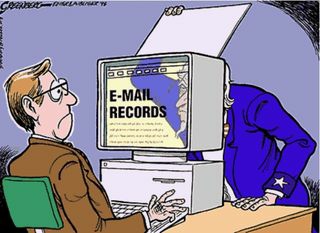
The IRS believes it can access taxpayer's emails without a warrant, according to a response to the American Civil Liberties Union (ACLU)'s asking for the agency's privacy policy. As a defense, the IRS seems to conjure the Electronic Communications Privacy Act (ECPA), which the ACLU calls "hopelessly outdated":
"It draws a distinction between email that is stored on an email provider's server for 180 days or less, and email that is older or has been opened. The former requires a warrant; the latter does not. Luckily, the Fourth Amendment still protects against unreasonable searches by the government."
Enacted in 1986, the Act doesn't account for where many people now store email: in the cloud. Similarly, the agency seems to claim that people have "no privacy expectation" for email stored on a server.
Although the IRS denies doing so, the agency may search social media sites for posts that may contradict some of the claims made on tax returns.
Discussion Starters:
- If the IRS did search and read your emails, what would it find?
- Does this news make you more cautious about what you might send over email? How so?
SEC Gives Guidance for Social Media Disclosures
Companies no longer have to wonder what is acceptable to disclose on social media sites. The SEC has set rules for how information may be disseminated on Facebook, Twitter, and other sites.
In the past, the SEC has been stringent on what companies can communication online. Because of Regulation Fair Disclosure (Reg FD), the SEC wanted to ensure that all investors have access to information at the same time, so that no one individual or group has an advantage in investing.
Now, the agency has softened its requirements. According to a New York Times article, companies can now post, with some restrictions:
"...companies could treat social media as legitimate outlets for communication, much like corporate Web sites or the agency's own public filing system called Edgar. The catch is that corporations have to make clear which Twitter feeds or Facebook pages will serve as potential outlets for announcements."
In a statement, the agency summarized the new rule:
"The Securities and Exchange Commission today issued a report that makes clear that companies can use social media outlets like Facebook and Twitter to announce key information in compliance with Regulation Fair Disclosure (Regulation FD) so long as investors have been alerted about which social media will be used to disseminate such information."
In other words, investors need to know a company's social media strategy-where information will be posted.
By most standards, the rules are long overdue. Companies such as Netflix have been investigated by the SEC for posting information on Facebook. The clarification will help companies use multiple channels to reach multiple audiences.
Discussion Starters:
- Read the SEC's statement. What else do you learn from reading "between the lines"?
- What questions or potential difficulties remain for companies deciding what, when, where, and how to post?
Emails Reveal Legal Bill Padding
Lawyers should know better than to send joke emails they want to keep private. Emails among attorneys at DLA Piper, the world's biggest law firm, have become public in a lawsuit about overbilling.
The suit is a counterclaim by an energy executive who has $675,000 in unpaid bills with DLA Piper. In the suit, Adam H. Victor accuses DLA Piper of inflating billable time by performing unnecessary tasks and taking too long to complete them with too many staff.
The emails seem to confirm his claims. Here are two examples, captured by The New York Times. In the first, an attorney says that "random people" were working on the case "for whatever reason" to "churn that bill, baby!"
In a second email, an attorney gloats about going $200,000 over the firm's estimate.
Discussion Starters:
- Describe what you perceive to be the working environment that supports these types of emails. In other words, what makes these acceptable-perhaps even encouraged?
- How do emails become public in such situations? Aren't they private-just sent to one or two people?
Twitter Turns 7
To celebrate its seventh birthday, Twitter produced a video to show its accomplishments and a few historic tweets.
Here are some stats about Twitter from 2012, of particular interest to business communicators:
- 56% of customer tweets to companies are being ignored.
- 32% of all Internet users are using Twitter.
- 34% of marketers have generated leads using Twitter.
The average age on Twitter is 37.3, according to Pingdom, compared to 40.5 for Facebook. As Twitter declines in average age, Facebook has increased-about two years in the past two years for each.
Discussion Starters:
- How do you use Twitter, if at all? What value do you see for you personally?
- What would inspire you to communicate with company via Twitter rather than Facebook or an online form?
MIT Media Lab SXSW Faux Pas
As the rest of us watch the snow fall, participants in the SXSW interactive festival in Austin are enjoying the technology, music, and general coolness of the event.
Festival mainstay MIT Media Labs surprised people with its promotional wristbands that many considered sexist. The bands were given to people who attended an MIT party.
In a blog post, the organization published this apology:
"We appreciate all of the feedback we've received about the party we hosted at The Parish Underground on Saturday night at SXSW. While we received a lot of positive responses, we want to address an issue with the wristbands that were given to people who came in the door. They were offensive and in no way reflect the sentiments of the MIT Media Lab. These wristbands were provided by the venue, and while we didn't realize what was printed on them until after they'd been handed out, we should have prevented the situation from occurring in the first place.
"The Media Lab is firmly committed to supporting women in the sciences, computing, arts, and engineering. We don't like – and certainly don't want to support or disseminate – offensive messaging. We appreciate those of you who noticed the wristbands and pointed them out to us; please accept our sincere apology."
Discussion Starters:
- What's your reaction to the wristbands: clever marketing, offensive, or something else?
- What's the significance, if any, of MIT Media Labs distributing the wristbands at SXSW?
- How do you assess the organization's apology?
Fake Menu for Guy Fieri's Restaurant
Note to business owners: register all web domains similar to your company's name. Guy Fieri didn't, and a prankster created a fake menu on guysamericankitchenandbar.com. Fieri's restaurant is at the URL GuysAmerican.com, and the fake menu is a good visual imitation of the real one.
Bryan Mytko had some fun with the idea and bragged about it on Twitter:
This is the second time Fieri is doing damage control in the past few months. The fake menu follows a scathing New York Times review of Fieri's restaurant.
Discussion Starters:
- What other domains should Guy Fieri have registered? At Easy Who Is, check a few more similar names to see who owns them.
- Should Guy Fieri try to get the domain back? If the owner wants him to pay, what do you think would be an appropriate price?
Burger King's Twitter Feed Hacked
Burger King is the latest victim of Twitter hacking. With its page image turned into a McDonald's logo, the company suffered embarrassment for an hour before Twitter closed down the account.
Within this time, the hacker offended Burger King employees, promoted a musician, and claimed that the company had been sold to McDonald's. The first tweet was, "We just got sold to McDonalds! Look for McDonalds in a hood near you." Another tweet read, "We caught one of our employees in the bathroom doing this..." with a photo of someone shooting a syringe into his arm.
During the incident, @McDonald's tweeted, "We empathize with our @BurgerKing counterparts. Rest assured, we had nothing to do with the hacking."
Burger King shared this statement with Mashable:
When Burger King regained control of its Twitter feed, the writer acknowledged the thousands of new followers and tweeted, "Interesting day here at Burger King, but we're back! Welcome to our new followers. Hope you all stick around!"
Meanwhile, Twitter is under fire for so many recent hacks. In response, the site may institute two-factor authentication, which requires a user to respond to a text message before gaining access to the account from a mobile device. Facebook, Google, and Dropbox already have similar processes in place.
Discussion Starters:
- How do you think the hacking occurred? Where might Burger King have vulnerabilities in its Twitter feed or process?
- How do you assess Burger King's response? What, if anything, could the company have done differently?
S&P Emails and IMs Part of Government Suit
When will people learn that internal communications can go public? The federal government is suing Standard & Poor's for knowingly rating securities too highly, in effect, bolstering deals before the 2008 financial crisis. Internal emails and instant messages support this claim.
In one IM exchange, two analysts discuss a pending crash, and one admits that "we give in anyway."

In another exchange, one analyst IMs to another that "we rate every deal...it could be structured by cows." And in an email exchange, an analyst describes the pressure at S&P, and a client questions the built-in conflict of interest.
Although the video doesn't seem to be available online, analysts created a parody of the song, "Burning Down the House," by the Talking Heads.
What was apparently clear to some pockets of Wall Street took a while to hit Main Street, where the real damage was done.
Discussion Starters:
- How else could these analysts have handled the pressure they were under?
- Why did these analysts feel comfortable communicating this way? Do you think S&P doesn't have a clear email policy? What else could be going on?
Applebee's Receipt Goes Public
Unhappy with not receiving a tip, an Applebee's server posted the signed check online-and got fired. The customer, Pastor Alois Bell, crossed out the 18% tip automatically added for large parties and wrote "0%" with the note, "I give God 10% why do you get 18?" The server, Chelsea, posted the receipt to the Atheism forum on Reddit.

Bell apparently left a $6 cash tip, but the server, Chelsea, was still offended by the note. When Bell learned that the receipt was posted online, she returned to Applebee's and demanded that everyone be fired. Later, she regreted her actions, calling them a lapse in judgement: "I've brought embarrassment to my church and ministry."
As expected, social media reactions are mixed, with many comments criticizing Applebee's decision to fire Chelsea. The company posted this response to its Facebook page:
"We wish this situation hadn't happened. Our Guests' personal information-including their meal check-is private, and neither Applebee's nor its franchisees have a right to share this information publicly. We value our Guests' trust above all else. Our franchisee has apologized to the Guest and has taken disciplinary action with the Team Member for violating their Guest's right to privacy."
In addition, the CEO posted a statement on Applebee's website, including the excerpt from the policy:
"Employees must honor the privacy rights of APPLEBEE's and its employees by seeking permission before writing about or displaying internal APPLEBEE'S happenings that might be considered to be a breach of privacy and confidentiality. This shall include, but not be limited to, posting of photographs, video, or audio of APPLEBEE'S employees or its customers, suppliers, agents or competitors, without first obtaining written approval from the Vice President of Operations. . . . Employees who violate this policy will be subject to disciplinary action, up to and including termination of employment."
Discussion Starters:
- What's your reaction to Chelsea's posting the receipt online? Was it her right, or did she misstep?
- Did Applebee's do the right thing by firing Chelsea? Why or why not? How do you assess the company's rationale-that posting the receipt was a violation of the guest's privacy?
- Read the CEO's statement. What do you consider his strongest and weakest arguments for terminating Chelsea?
Teacher May Be Fired for Posting Pics of Students
A teacher is under pressure for posting pictures of her students with duct tape across their mouths. What was intended as a funny moment within a class has become an issue for an Ohio school board.
When a middle-school student had trouble with her binder, 33-year-old teacher Melissa Cairns gave her some duct tape to hold it together. Instead, the student put the tape across her mouth. Getting a laugh from students encouraged others to do the same.
According to Cairns, the students asked her to talk a picture. She did. And posted it to Facebook with the caption, "Finally found a way to get them to be quiet!!!"
Another school employee reported her. Cairns removed the picture, as requested, but she is now suspended on unpaid leave, awaiting the school's decision.
Discussion Starters:
- What about the teacher's perspective (in her video interview) makes sense to you? What doesn't?
- If you were the school principal, how would you handle the situation?
- Imagine that you're a parent of one of the children whose picture was posted. What do you suppose your reaction might be?
- The CNET article refers to Cairns' "private" Facebook page. Is Facebook private?
- What could a school do to prevent this type of situation in the future?


